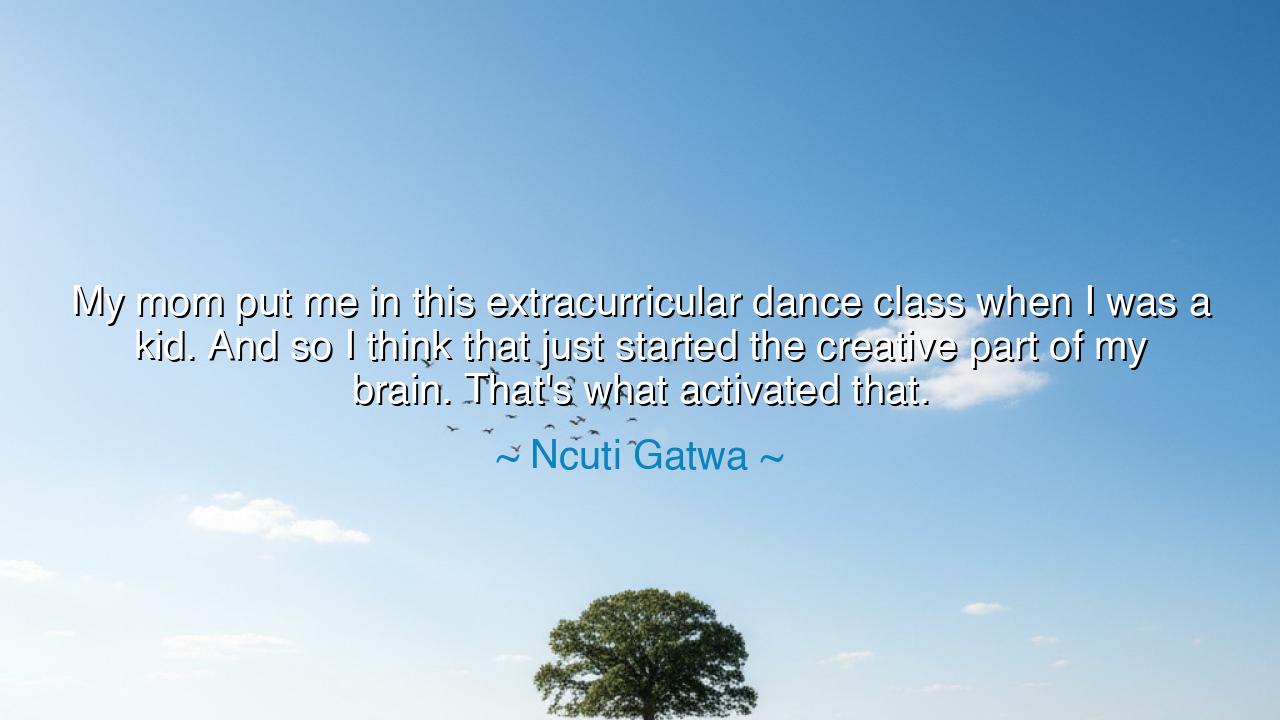
My mom put me in this extracurricular dance class when I was a
My mom put me in this extracurricular dance class when I was a kid. And so I think that just started the creative part of my brain. That's what activated that.






In the reflective and heartfelt words of Ncuti Gatwa, there unfolds a truth as old as humanity itself: “My mom put me in this extracurricular dance class when I was a kid. And so I think that just started the creative part of my brain. That’s what activated that.” What he speaks of is more than the tale of a childhood memory — it is the eternal story of awakening, of the seed of creativity being stirred by love, guidance, and opportunity. Beneath this gentle recollection lies a universal principle: that a single act, born from care and vision, can shape the destiny of a soul.
Gatwa, a Rwandan-born actor who would go on to achieve international acclaim, looks back not on fame or fortune, but on the moment of ignition — that instant when a spark was lit in the vast landscape of the mind. His mother’s decision to place him in dance was not just an extracurricular activity; it was an offering, a sacred gesture of belief in his potential. The ancients would have called this the planting of the inner flame — the moment when art touches the spirit and awakens what lies dormant. From that small act, a creative consciousness began to bloom, guiding him toward expression, storytelling, and the art that would later move millions.
In every civilization, the greatest creators have traced their beginnings to such moments of nurture. The philosopher Plato once said that education is not the filling of a vessel, but the lighting of a flame. And so it was with Gatwa. His mother, by placing him in that dance class, did not force greatness upon him — she simply gave him the space to discover his own rhythm. This is the divine role of those who guide the young: not to dictate what they must become, but to open the doors that let the spirit breathe. For within every child is an untouched realm of imagination, waiting for the key of encouragement to unlock it.
Consider the story of Michelangelo, who as a boy was scolded by his father for pursuing sculpture instead of business. Yet it was an art teacher, seeing the boy’s gift, who guided his hands and inspired his mind. From that early encouragement arose a genius that carved eternity into stone. So too with Ncuti Gatwa: what began as a child’s dance — a simple movement of joy — became the foundation of a career built on expression and grace. This truth binds all eras together: the beginnings of greatness are often humble, born not of wealth, but of wonder.
What Gatwa reminds us of is the power of art to awaken the mind. In the ancient academies of Greece, dance, music, and poetry were not considered diversions, but sacred practices that harmonized body, intellect, and soul. Movement was seen as philosophy in motion, a way of teaching rhythm, discipline, and emotional truth. By placing him in dance, his mother unknowingly gave him the gift of harmony — a bridge between intellect and emotion, mind and body, thought and expression. Through dance, he learned not only coordination, but connection — to others, to music, and to himself.
This quote also speaks to the eternal bond between parent and child, between mentor and student. The ancients revered this bond as sacred — the chain through which wisdom passes from one generation to the next. Gatwa’s gratitude toward his mother echoes that of countless sons and daughters whose journeys were shaped by unseen sacrifices and quiet acts of faith. Her simple choice became a cornerstone of his future. Such acts remind us that destiny often begins in the smallest decisions — a class attended, a word spoken, a hand extended — each one capable of altering the course of a life.
And so, the lesson for all who hear these words is clear: Nurture the creative spark — in yourself, and in others. Do not dismiss the small passions of youth as frivolous; within them may lie the foundation of purpose. Parents, teachers, mentors — offer opportunities for play, for art, for curiosity, for they awaken the deeper parts of the mind that logic alone cannot reach. And to those who seek purpose, look back to what once made your heart move — for there, in the forgotten joys of childhood, you may rediscover your truest calling.
Thus, in Ncuti Gatwa’s remembrance, we are reminded of the sacred dance between circumstance and soul — how a mother’s care can awaken genius, how art can heal and reveal, and how every person carries within them a sleeping artist, waiting to be stirred. His words are a song of gratitude, a celebration of beginnings, and a call to honor the power of creativity. For when the creative spirit is awakened — when that part of the brain and heart is truly activated — it becomes not just a source of talent, but of purpose, of joy, and of meaning that endures through all the ages.






AAdministratorAdministrator
Welcome, honored guests. Please leave a comment, we will respond soon